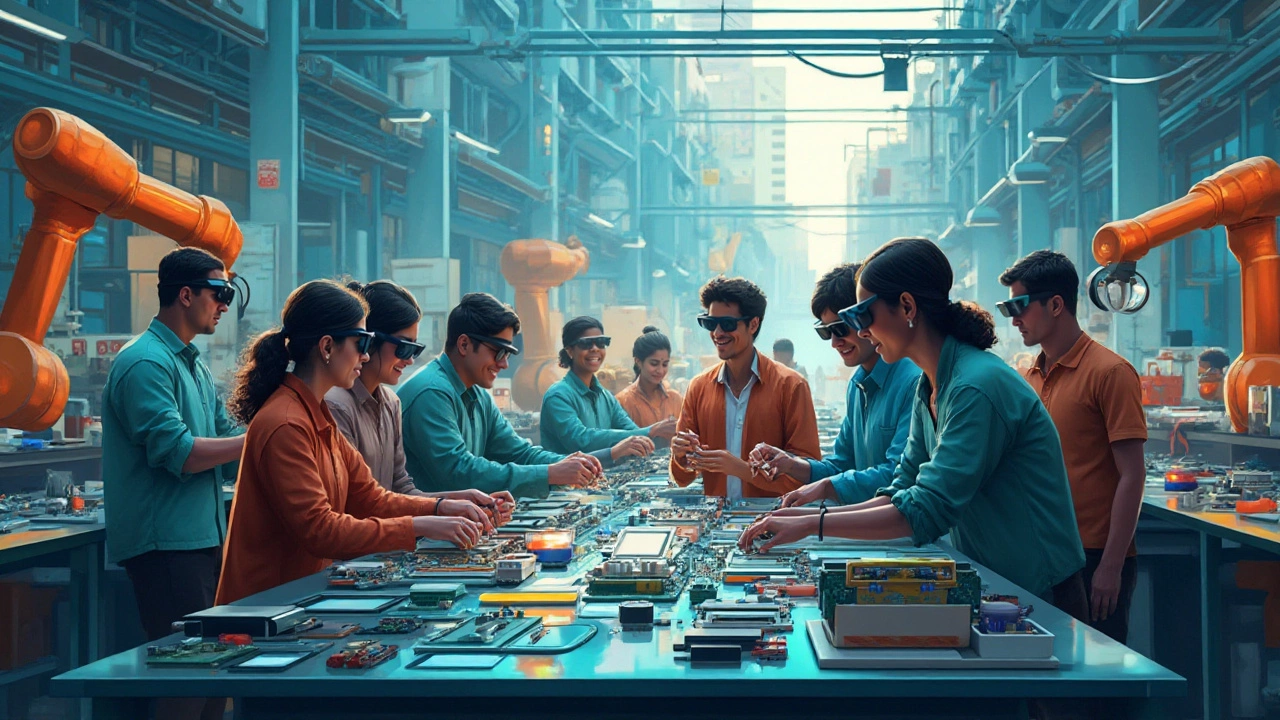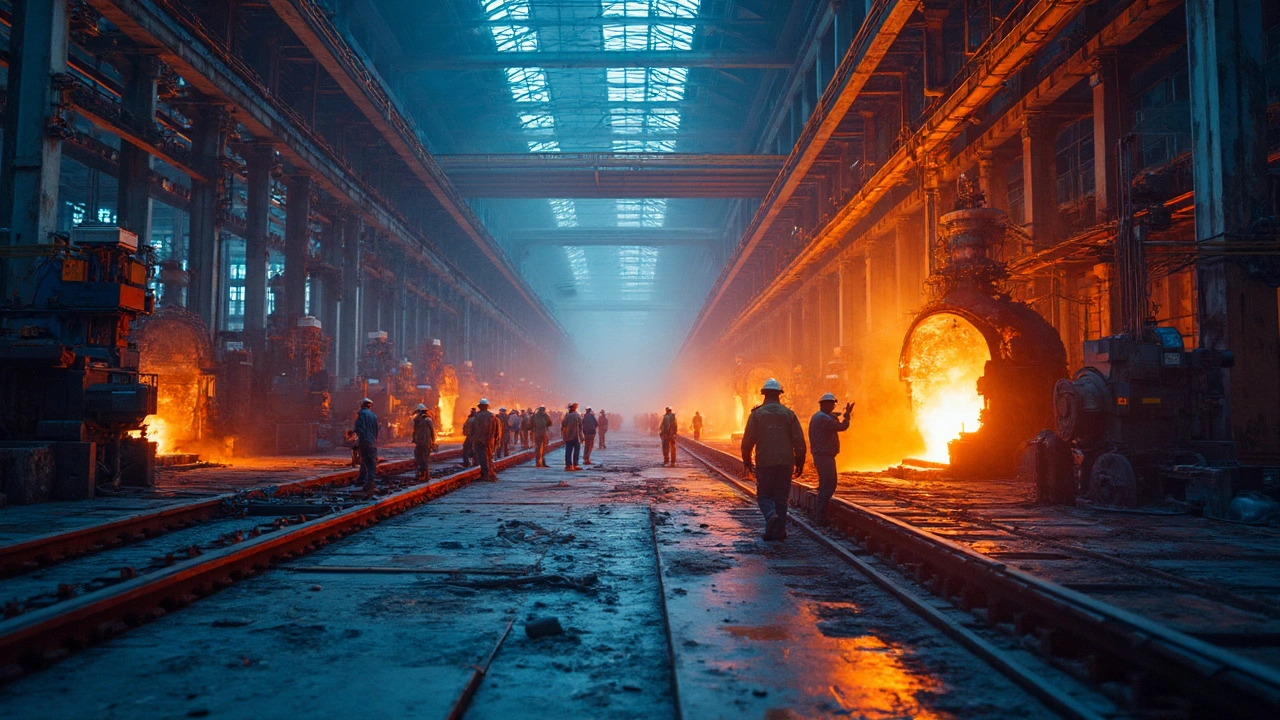Top Manufacturing Businesses to Become a Millionaire

In today's dynamic world, one of the most promising paths to wealth is through the manufacturing sector. This realm, rich with innovation and opportunities, offers several avenues for aspiring millionaires.
From eco-friendly products to high-tech gadgets, manufacturing covers a broad spectrum that can cater to various market demands. It's not just about making things; it's about making the right things. With a keen eye on trends and a strategic approach, the manufacturing industry can be a goldmine for entrepreneurs willing to take the plunge.
- Understanding the Manufacturing Landscape
- Sustainable Manufacturing Opportunities
- Tech-Driven Manufacturing Ventures
- The Rise of Personalized Products
- Strategic Tips for Success
- Future Trends and Considerations
Understanding the Manufacturing Landscape
The journey into the manufacturing landscape is akin to discovering a multifaceted world of opportunities. This vast sector is integral to the global economy, crossing various domains from agriculture to high-tech industries. Manufacturing business ideas are not only the backbone of industrial development but also a significant contributor to employment and market expansion. Historically, industrial revolutions have underscored the importance of manufacturing as the driving force behind economic leaps. Today, it's not just about mass production but innovation and adaptability.
Manufacturing has evolved from its traditional roots to embrace the wonders of digital technology. Smart factories and lean manufacturing techniques are now at the forefront, ensuring higher efficiency and reduced waste. For those looking to embark on this lucrative journey, recognizing the importance of embracing change is crucial. The aspect of being able to integrate cutting-edge technology with reliable production methods can set apart thriving enterprises from those that struggle. This industry is constantly in flux, shaped by changing consumer demands and technological innovations. To enter the manufacturing domain, an entrepreneur must be keenly aware of these shifts and adaptable in their approach.
"The value of manufacturing is profound. It represents innovation, job creation, and national security." - Former US President Barack Obama.
Such profound remarks highlight the economic prowess embedded within manufacturing. This doesn't just refer to large-scale operations but also to the potential for small and medium enterprises to make their mark. New entrepreneurs can find plenty of best businesses to start, especially when they tap into niche markets or create innovative products. The current trends favor sectors like green technologies, health equipment, and smart-home products.
Delving into the landscape further, one cannot ignore the rise of sustainable manufacturing processes. This aligns with the growing global emphasis on eco-friendly practices. Sustainable practices can be not just good for the planet, but incredibly effective in building an ethical brand that consumers trust. They help meet regulatory demands, which are becoming stricter worldwide, thus opening avenues for entrepreneurship in compliant manufacturing.
Sustainable Manufacturing Opportunities
The realm of sustainable manufacturing has burgeoned into a vibrant sector, driven by a global shift towards eco-friendly practices and a pressing demand for green products. As environmental concerns reach unprecedented heights, consumers and businesses alike are leaning toward choices that minimize harm to the planet. This shift represents a fertile ground for entrepreneurs looking to establish profitable ventures while also making a positive impact.
One promising opportunity lies in the development of biodegradable materials. Companies are increasingly turning to natural resources as alternatives to traditional plastics, which are notorious for cluttering landfills and polluting oceans. Products ranging from compostable packaging solutions to eco-friendly textiles are capturing significant market interest. Another key area is renewable energy products such as solar panels and wind turbine components, which are vital in the transition to cleaner energy sources.
Embedded within this trend is the principle of circular economy, an innovative model that focuses on designing waste out of the system. Manufacturing that integrates recycling and reuse at its core not only reduces the environmental footprint but also cuts costs associated with raw material procurement. A report by the Ellen MacArthur Foundation highlights, "Companies embracing circular strategies could generate significant value and societal benefits over the next decade." Incorporating this approach provides a competitive edge, as resources become scarcer and waste management infrastructure grows in importance.
Another pivotal development is sustainable fashion. This burgeoning industry addresses the need for eco-conscious clothing, emphasizing organic and recycled materials. Brands that focus on ethically sourced fibers and on-demand manufacturing stand out, offering environmentally aware consumers stylish alternatives. Furthermore, sustainable manufacturing in the beauty and personal care industries is gaining traction, with biodegradable packaging and natural ingredients taking center stage.
Investment in sustainable manufacturing extends beyond environmental considerations—it also aligns with shifting consumer values. A vast majority of consumers now express willingness to pay a premium for products that are both high-quality and eco-friendly. Entrepreneurs venturing into this space must position their offerings as not only beneficial to the planet but also superior in function and design. Partnerships with certification bodies can enhance brand credibility by assuring consumers of sustainable practices.
In addition, the support from governments worldwide, recognizing the pressing need for sustainable solutions, manifests through incentives such as tax rebates and grants. These initiatives aim to alleviate the financial burdens faced by businesses committed to environmentally responsible manufacturing. Maintaining awareness of these policy frameworks is crucial for any aspiring entrepreneur in the sector.

Tech-Driven Manufacturing Ventures
The world of manufacturing is being revolutionized by technology at an unprecedented pace. As digital innovation reshapes every facet of society, tech-driven manufacturing ventures are unlocking staggering opportunities for wealth creation. Companies that adeptly harness cutting-edge technologies such as artificial intelligence, robotics, and the Internet of Things are not just enhancing their production capabilities but also gaining a competitive edge in the global market. This sector is particularly appealing to entrepreneurs due to its potential to minimize costs and maximize output efficiency. Imagine a factory where machines communicate seamlessly with each other to predict maintenance needs, optimize energy use, and adapt to shifts in demand—all autonomously. This is the essence of smart manufacturing, and it's paving the way for a new era of industry.
One noteworthy aspect of tech-driven manufacturing is the integration of AI and machine learning to customize production processes. By analyzing vast amounts of data, AI can identify patterns and predict outcomes, leading to more efficient and precise manufacturing. This can drastically reduce waste and improve product quality, which are key factors in sculpting a successful business model. An example is the automotive industry, where AI is not only optimizing assembly lines but also contributing to innovations like autonomous vehicles. According to Deloitte, by 2025, more than half of manufacturing organizations will have adopted AI systems, signifying a shift towards more data-driven decision-making processes in production lines.
"The marriage of digital tools with manufacturing processes is no longer a futuristic concept," says John Wilczynski, Executive Director of America Makes. "It's a present-day reality transforming economies."
Turning to 3D printing, or additive manufacturing, it's a sweeping force enabling startups and established firms alike to innovate without the traditional constraints of tooling or supply chain logistics. This transformative technology allows for rapid prototyping and short-run production, significantly reducing time-to-market for new products. Industries ranging from aerospace to healthcare have embraced 3D printing for creating intricate designs that were once deemed impossible. The healthcare sector, for instance, uses 3D printing to create tailor-made prosthetics and implants, leading to personalized medicine that aligns with individual patient needs. A survey by Statista in 2023 projected that the global market for 3D printing products and services would reach approximately 40 billion dollars by 2025, underscoring the substantial growth potential in this domain.
The rise of the Industrial Internet of Things (IIoT) marks another significant leap in the evolution of manufacturing. IIoT connects machinery and equipment to the internet, facilitating enhanced communication and process automation within factories. This connectivity not only improves operational efficiency but also provides valuable insights into manufacturing systems. With IIoT, manufacturers can implement predictive maintenance strategies that diminish downtime and extend the lifespan of machinery. The impact of IIoT is profound, with reports suggesting that by 2024, companies utilizing IIoT solutions could see a 25% increase in manufacturing productivity. Such enhancements are crucial for businesses aiming to scale, providing a solid foundation for growing into millionaire enterprises.
Lastly, cybersecurity is an essential consideration within tech-driven manufacturing, as interconnected systems are susceptible to cyber threats. Protecting intellectual property, ensuring data integrity, and safeguarding customer data are paramount for businesses to maintain trust and competitive advantage. Companies are investing heavily in security measures, and the role of cybersecurity experts is steadily rising in prominence within the manufacturing sector. These experts employ advanced encryption methods and continuous monitoring to protect sensitive data from cyber adversaries, and this aspect forms a critical part of the overall technological ecosystem in modern manufacturing.
The Rise of Personalized Products
As the world becomes more interconnected, consumers are increasingly looking for products that cater specifically to their individual tastes and preferences. The market for personalized products is booming as people seek items that reflect their unique personalities and lifestyles. From customized sneakers and bespoke clothing to tailored tech gadgets, there's a growing demand for uniqueness that highlights the essence of individuality.
The shift towards personalization is not just a fleeting trend; it represents a significant change in how brands engage with customers. According to a study by Deloitte, more than 50% of consumers expressed interest in purchasing personalized products. This demonstrates a clear opportunity for savvy entrepreneurs to tap into this lucrative sector. Brands that understand how to efficiently manufacture personalized items, using technologies such as 3D printing and AI-driven customization tools, are well-positioned to capture market share.
One compelling example of success in this arena is the rise of custom smartphone cases. Many companies have built thriving businesses around this concept, allowing customers to design their own cases with images, texts, and colors of their choice. This business model not only meets the demand for customization but also capitalizes on the emotional investment buyers feel when creating something uniquely theirs. According to a market analysis, the personalized gifts industry alone is projected to reach $41.3 billion by 2027—showcasing the massive potential that lies in this niche.
"Personalization is more than a trend; it's a paradigm shift driving the future of consumer goods. Companies focusing on bespoke offerings will lead in brand loyalty and market innovation," says a report released by McKinsey & Company.
Manufacturers can leverage this growing trend by integrating advanced tech solutions into their production processes. Investing in tools that allow for small-batch production or on-demand manufacturing can drastically reduce costs while increasing profit margins. These technologies empower businesses to meet personalized requests at scale without the traditional waste associated with mass production.
Embracing Technology in Personalization
Embracing technologies that enhance manufacturing capabilities is crucial in the race to dominate the personalized products market. For instance, 3D printing offers a versatile solution for creating varied and intricate designs without the need for extensive inventory. This technology not only reduces material waste but also shortens the lead time between order and delivery, ensuring customer satisfaction. Implementing AI for analyzing consumer preferences can further refine product offerings, making customization even more precise.
- 3D Printing: Rapid prototyping and low-cost production enable personalized design execution.
- AI-Driven Customization: Analyzing customer data to fine-tune product features offers a competitive edge.
- Sustainable Materials: Using eco-friendly options appeals to both environmentally conscious consumers and modern production standards.
Entrepreneurs who wish to delve into manufacturing personalized products should focus on creating a seamless customer experience. From intuitive online platforms that allow customers to design their products to efficient logistics solutions that ensure timely delivery, every aspect plays a vital role in building a successful business in this domain. As the preference for personalized items grows, manufacturers have a golden opportunity to redefine traditional production philosophies and embrace the bespoke revolution.

Strategic Tips for Success
Building a prosperous manufacturing business is not just about having a groundbreaking idea; it's about executing it with precision. Here are several strategic tips to ensure your manufacturing venture not only survives but thrives in the competitive market. Begin by thoroughly researching your target market. Understanding the demand dynamics, consumer preferences, and potential competitors in your chosen field of manufacturing business ideas is crucial. A comprehensive market analysis will guide you in selecting the most lucrative niche, thereby aligning your business with market needs.
Leverage cutting-edge technology to optimize production processes and enhance product quality. In this age of technological advancement, adopting automation, AI, and IoT integrations can drastically reduce costs and improve efficiency. The transition to smart manufacturing not only helps in consistency and speed but also elevates the precision of your goods, making your business more competitive. In fact, a recent report from McKinsey suggests that companies could increase productivity by 20-30% by fully implementing these technologies.
Investing in sustainable practices is becoming increasingly indispensable in the modern manufacturing world. With consumers more environmentally conscious than ever, integrating green techniques can set your business apart. This not only appeals to the eco-friendly segment of the market but can also result in significant cost savings in the long run. According to the International Energy Agency, implementing energy-efficient systems has the potential to save manufacturers up to 25% in operational costs.
"Profitability is the goal of every business, but the key to lasting profits is sustainability," Jane Goodall once wisely stated. As sustainability becomes a cornerstone of corporate responsibility, being ahead in green manufacturing will likely result in higher long-term profitability.
A strong, skilled workforce is the backbone of any successful manufacturing firm. Ensure that you invest in recruiting talented professionals and continually upgrade their skills with regular training. This not only boosts morale and reduces turnover but also enhances productivity. Moreover, promoting a culture of innovation within the company can lead to breakthrough innovations.
Last but definitely not least, developing a robust supply chain strategy cannot be overstated. The recent disruptions faced globally have highlighted the importance of agile and resilient supply chain networks. Building relationships with multiple suppliers across different regions can mitigate risks and ensure a steady flow of raw materials. In this way, you can avoid the pitfalls of supply chain interruptions and keep your production line running smoothly. By implementing these strategic tactics, your journey towards becoming a millionaire through manufacturing is well paved.
Future Trends and Considerations
In the fast-paced world of manufacturing business ideas, staying ahead requires a keen sense of future trends and considerations. It's essential to understand that the market is not static, and the coming years will bring shifts that can redefine the landscape. One significant trend gaining momentum is the increased focus on sustainability. As consumers become more environmentally conscious, there’s a growing demand for eco-friendly products and processes. Manufacturing businesses that incorporate sustainable practices will likely find themselves at a competitive advantage. This includes reducing waste, using renewable materials, and optimizing production methods to lower carbon footprints. The impetus towards sustainability is not just ethical; it's rapidly becoming economically essential, with many companies finding that green initiatives lead to cost savings and brand loyalty.
"The future of manufacturing belongs to those who embrace sustainable practices today," states a report by the International Institute for Environment and Development.
Another key trend is the integration of technology, particularly AI and automation, into manufacturing processes. The use of AI to predict maintenance needs, manage supply chains, and optimize workflows has the potential to revolutionize efficiency in production. Automation, while not a new concept, continues to evolve with robotics becoming more sophisticated and affordable. This technological advancement opens doors for small to medium enterprises to compete on larger scales without exorbitant labor costs. The challenge, however, is in the implementation and integration of such technologies, which require careful planning and investment in human skills to manage these new systems effectively.
Moreover, the concept of personalized products is significantly shaping the future of tech-driven manufacturing ventures. Customization is becoming a major selling point, with consumers willing to pay a premium for products tailored to their preferences. From custom-fit clothing to bespoke furniture, the ability to cater to individual needs enhances customer experience and loyalty. This trend is supported by advances in digital manufacturing, including 3D printing, which allows for rapid prototyping and production at lower costs. Businesses tapping into this arena need to focus on agile manufacturing capabilities and flexible supply chains to respond quickly to consumer demands.
Looking ahead, those involved in manufacturing should also consider geopolitical factors that influence global trade. Trade agreements, tariffs, and supply chain disruptions can significantly impact manufacturing strategies. An emphasis on localization—producing closer to the point of consumption—is becoming an effective strategy to mitigate these risks. This approach not only reduces logistics costs but also enhances the ability to adapt to regional market demands swiftly.
A study by the Manufacturing Leadership Council highlights that by 2025, manufacturers expect to see a 25% increase in their Internet of Things (IoT) investments. With IoT, manufacturers can enable smarter decision-making processes through real-time monitoring and data collection, thus enhancing product quality and operational excellence. These innovations are not just about keeping up but about ensuring competitiveness in a future that's increasingly defined by connectivity and digital integration.
Ultimately, venturing into the world of manufacturing with an eye on these future trends can position businesses not just to survive, but to thrive. Entrepreneurs should remain adaptable, receptive to change, and proactive in their strategic planning to make the most of the opportunities that these emerging trends present.





